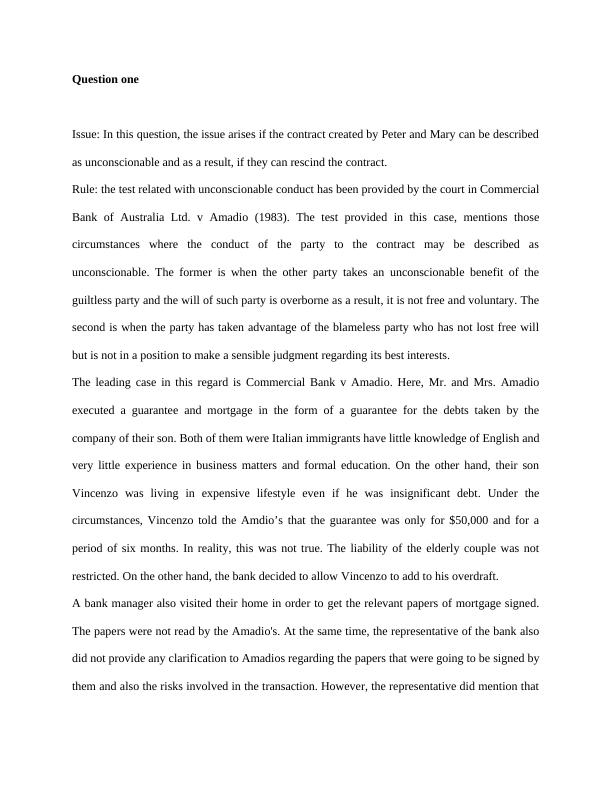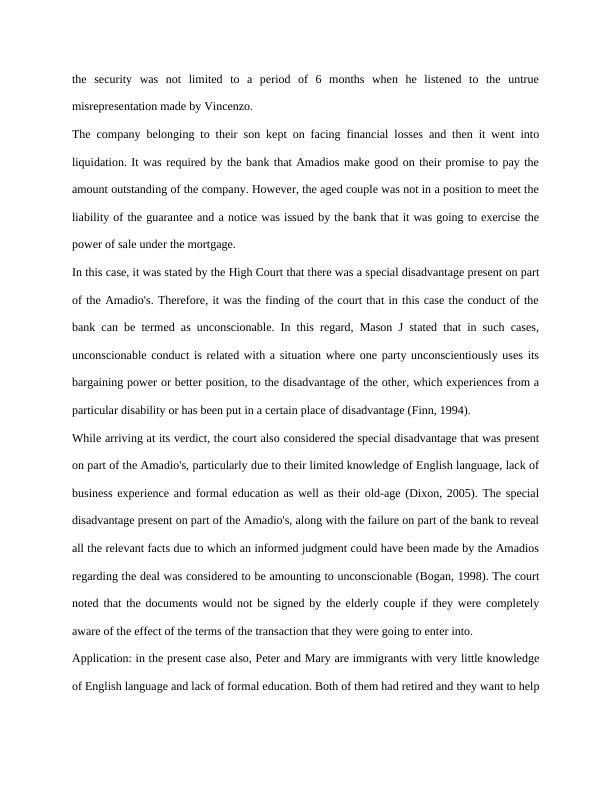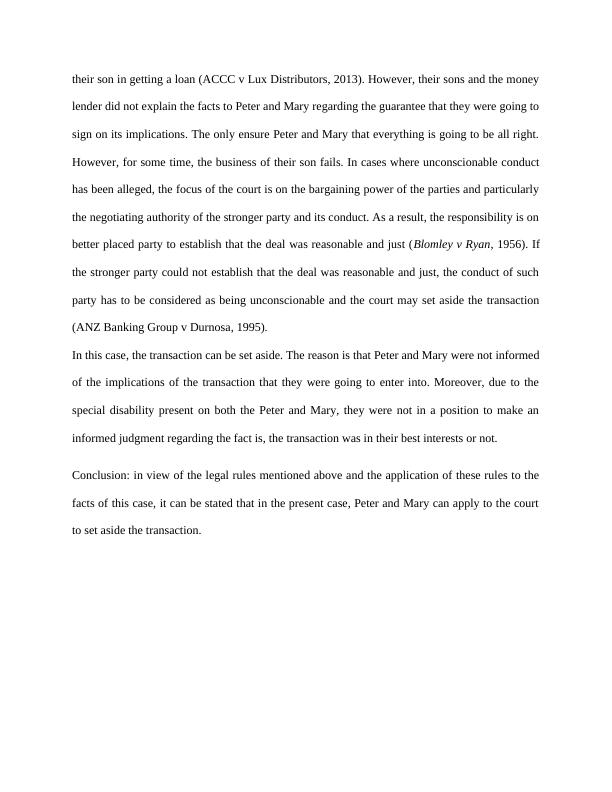Legal Remedies for Unconscionable Conduct and Oppressive Conduct
Added on 2023-06-05
8 Pages2272 Words458 Views
Question one
Issue: In this question, the issue arises if the contract created by Peter and Mary can be described
as unconscionable and as a result, if they can rescind the contract.
Rule: the test related with unconscionable conduct has been provided by the court in Commercial
Bank of Australia Ltd. v Amadio (1983). The test provided in this case, mentions those
circumstances where the conduct of the party to the contract may be described as
unconscionable. The former is when the other party takes an unconscionable benefit of the
guiltless party and the will of such party is overborne as a result, it is not free and voluntary. The
second is when the party has taken advantage of the blameless party who has not lost free will
but is not in a position to make a sensible judgment regarding its best interests.
The leading case in this regard is Commercial Bank v Amadio. Here, Mr. and Mrs. Amadio
executed a guarantee and mortgage in the form of a guarantee for the debts taken by the
company of their son. Both of them were Italian immigrants have little knowledge of English and
very little experience in business matters and formal education. On the other hand, their son
Vincenzo was living in expensive lifestyle even if he was insignificant debt. Under the
circumstances, Vincenzo told the Amdio’s that the guarantee was only for $50,000 and for a
period of six months. In reality, this was not true. The liability of the elderly couple was not
restricted. On the other hand, the bank decided to allow Vincenzo to add to his overdraft.
A bank manager also visited their home in order to get the relevant papers of mortgage signed.
The papers were not read by the Amadio's. At the same time, the representative of the bank also
did not provide any clarification to Amadios regarding the papers that were going to be signed by
them and also the risks involved in the transaction. However, the representative did mention that
Issue: In this question, the issue arises if the contract created by Peter and Mary can be described
as unconscionable and as a result, if they can rescind the contract.
Rule: the test related with unconscionable conduct has been provided by the court in Commercial
Bank of Australia Ltd. v Amadio (1983). The test provided in this case, mentions those
circumstances where the conduct of the party to the contract may be described as
unconscionable. The former is when the other party takes an unconscionable benefit of the
guiltless party and the will of such party is overborne as a result, it is not free and voluntary. The
second is when the party has taken advantage of the blameless party who has not lost free will
but is not in a position to make a sensible judgment regarding its best interests.
The leading case in this regard is Commercial Bank v Amadio. Here, Mr. and Mrs. Amadio
executed a guarantee and mortgage in the form of a guarantee for the debts taken by the
company of their son. Both of them were Italian immigrants have little knowledge of English and
very little experience in business matters and formal education. On the other hand, their son
Vincenzo was living in expensive lifestyle even if he was insignificant debt. Under the
circumstances, Vincenzo told the Amdio’s that the guarantee was only for $50,000 and for a
period of six months. In reality, this was not true. The liability of the elderly couple was not
restricted. On the other hand, the bank decided to allow Vincenzo to add to his overdraft.
A bank manager also visited their home in order to get the relevant papers of mortgage signed.
The papers were not read by the Amadio's. At the same time, the representative of the bank also
did not provide any clarification to Amadios regarding the papers that were going to be signed by
them and also the risks involved in the transaction. However, the representative did mention that

the security was not limited to a period of 6 months when he listened to the untrue
misrepresentation made by Vincenzo.
The company belonging to their son kept on facing financial losses and then it went into
liquidation. It was required by the bank that Amadios make good on their promise to pay the
amount outstanding of the company. However, the aged couple was not in a position to meet the
liability of the guarantee and a notice was issued by the bank that it was going to exercise the
power of sale under the mortgage.
In this case, it was stated by the High Court that there was a special disadvantage present on part
of the Amadio's. Therefore, it was the finding of the court that in this case the conduct of the
bank can be termed as unconscionable. In this regard, Mason J stated that in such cases,
unconscionable conduct is related with a situation where one party unconscientiously uses its
bargaining power or better position, to the disadvantage of the other, which experiences from a
particular disability or has been put in a certain place of disadvantage (Finn, 1994).
While arriving at its verdict, the court also considered the special disadvantage that was present
on part of the Amadio's, particularly due to their limited knowledge of English language, lack of
business experience and formal education as well as their old-age (Dixon, 2005). The special
disadvantage present on part of the Amadio's, along with the failure on part of the bank to reveal
all the relevant facts due to which an informed judgment could have been made by the Amadios
regarding the deal was considered to be amounting to unconscionable (Bogan, 1998). The court
noted that the documents would not be signed by the elderly couple if they were completely
aware of the effect of the terms of the transaction that they were going to enter into.
Application: in the present case also, Peter and Mary are immigrants with very little knowledge
of English language and lack of formal education. Both of them had retired and they want to help
misrepresentation made by Vincenzo.
The company belonging to their son kept on facing financial losses and then it went into
liquidation. It was required by the bank that Amadios make good on their promise to pay the
amount outstanding of the company. However, the aged couple was not in a position to meet the
liability of the guarantee and a notice was issued by the bank that it was going to exercise the
power of sale under the mortgage.
In this case, it was stated by the High Court that there was a special disadvantage present on part
of the Amadio's. Therefore, it was the finding of the court that in this case the conduct of the
bank can be termed as unconscionable. In this regard, Mason J stated that in such cases,
unconscionable conduct is related with a situation where one party unconscientiously uses its
bargaining power or better position, to the disadvantage of the other, which experiences from a
particular disability or has been put in a certain place of disadvantage (Finn, 1994).
While arriving at its verdict, the court also considered the special disadvantage that was present
on part of the Amadio's, particularly due to their limited knowledge of English language, lack of
business experience and formal education as well as their old-age (Dixon, 2005). The special
disadvantage present on part of the Amadio's, along with the failure on part of the bank to reveal
all the relevant facts due to which an informed judgment could have been made by the Amadios
regarding the deal was considered to be amounting to unconscionable (Bogan, 1998). The court
noted that the documents would not be signed by the elderly couple if they were completely
aware of the effect of the terms of the transaction that they were going to enter into.
Application: in the present case also, Peter and Mary are immigrants with very little knowledge
of English language and lack of formal education. Both of them had retired and they want to help

their son in getting a loan (ACCC v Lux Distributors, 2013). However, their sons and the money
lender did not explain the facts to Peter and Mary regarding the guarantee that they were going to
sign on its implications. The only ensure Peter and Mary that everything is going to be all right.
However, for some time, the business of their son fails. In cases where unconscionable conduct
has been alleged, the focus of the court is on the bargaining power of the parties and particularly
the negotiating authority of the stronger party and its conduct. As a result, the responsibility is on
better placed party to establish that the deal was reasonable and just (Blomley v Ryan, 1956). If
the stronger party could not establish that the deal was reasonable and just, the conduct of such
party has to be considered as being unconscionable and the court may set aside the transaction
(ANZ Banking Group v Durnosa, 1995).
In this case, the transaction can be set aside. The reason is that Peter and Mary were not informed
of the implications of the transaction that they were going to enter into. Moreover, due to the
special disability present on both the Peter and Mary, they were not in a position to make an
informed judgment regarding the fact is, the transaction was in their best interests or not.
Conclusion: in view of the legal rules mentioned above and the application of these rules to the
facts of this case, it can be stated that in the present case, Peter and Mary can apply to the court
to set aside the transaction.
lender did not explain the facts to Peter and Mary regarding the guarantee that they were going to
sign on its implications. The only ensure Peter and Mary that everything is going to be all right.
However, for some time, the business of their son fails. In cases where unconscionable conduct
has been alleged, the focus of the court is on the bargaining power of the parties and particularly
the negotiating authority of the stronger party and its conduct. As a result, the responsibility is on
better placed party to establish that the deal was reasonable and just (Blomley v Ryan, 1956). If
the stronger party could not establish that the deal was reasonable and just, the conduct of such
party has to be considered as being unconscionable and the court may set aside the transaction
(ANZ Banking Group v Durnosa, 1995).
In this case, the transaction can be set aside. The reason is that Peter and Mary were not informed
of the implications of the transaction that they were going to enter into. Moreover, due to the
special disability present on both the Peter and Mary, they were not in a position to make an
informed judgment regarding the fact is, the transaction was in their best interests or not.
Conclusion: in view of the legal rules mentioned above and the application of these rules to the
facts of this case, it can be stated that in the present case, Peter and Mary can apply to the court
to set aside the transaction.

End of preview
Want to access all the pages? Upload your documents or become a member.
Related Documents
Commercial Bank of Australia Ltd v Amadio (1983) 151 CLR 447lg...
|7
|1762
|98
Unconscionable Conduct in Commercial Bank of Australia Ltd and Amadio Caselg...
|6
|1015
|109
Business Management- Case Studylg...
|8
|1527
|78
Unconscionable Conduct and Misrepresentation in Contract Lawlg...
|8
|2229
|411
Liability of Guarantor in Commercial Lawlg...
|7
|2014
|298
BIS101 Law Assignment: Law of Contract and Tortlg...
|7
|1162
|41
